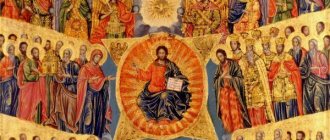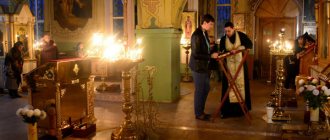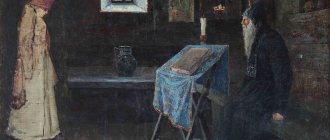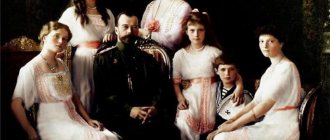Dear reader!
This material is collected from the Patristic literature, which is freely available on the Internet, both separately (in excerpts) and in entire electronic books, the volumes of which are very large for the modern reader, who, as a rule, is accustomed to grasping only the superficial essence. The author of this project has systematized and selected the material as much as possible, highlighting the most important things, focusing on his point of view.
The creator of this project does not claim authorship of the presented materials and strongly recommends that interested readers purchase the full versions of the Patristic works in printed form. The sources used are listed in a special section of our website “Recommended Literature and Sources”; in addition, we accompanied each book with a short review, useful for all concerned readers.
What is the essence of Christian achievement?
- St. Mark the Ascetic says: “Feats are not anything special from the commandments.”
Feats are the commandments. Do you and I fulfill God’s commandments every day? Yes, we are trying to do something, at least pray. But in fact, the commandments are a whole spiritual mechanism that not only needs to be sent every day, but also needs to be thought about a lot.
- St. Macarius of Egypt speaks about the essence of the feat: “This is resistance to the evil one and evil thoughts.” He expressed the general principle that characterizes the feat.
The Holy Fathers say that feat should be everywhere: no matter where you are, you should always be engaged in feat. For each person, as we will see later, the feat occurs differently depending on one’s spiritual life. But what we have in common—resistance to the evil one (i.e., the devil) and resistance to evil thoughts—must always be with us. What is this? When you are just walking, you need to listen to your inner world - what is happening there. We constantly have different thoughts there - dirty, unclean, in any case, temptations occur there. And many temptations in practice also come from the evil one, and various proposals come to us in life - to commit some kind of meanness, sin, etc. This is exactly what Saint Macarius says, that all this must be rejected and fought. This is one of the essences of achievement.
- Struggle, war against everything bad and sinful that is in this world, because feat is not only a spiritual endeavor, but it necessarily extends to social life.
- “Cleansing the mind and uniting with God,” says St. Peter of Damascus. And the Monk Simeon the New Theologian calls this deification, that is, union with God, when a person achieves deification through fulfilling the commandments of Christ. This is the goal of achievement - union with God.
South Butovo training ground or mass grave of saints
We can say with confidence that in the whole world there is no more terrible, but also more sacred place than South Butovo near Moscow. It was here, at the then existing training ground, that mass executions of repressed and convicted people took place. Of course, many future saints died in other places - in exile, camps, and forced labor. But South Butovo forever entered the history of Christianity as the burial place of a record number of famous saints.
By the beginning of the revolution, Butovo was a large estate on which one of the largest stud farms in Russia was located. Elite horses were raised here; the estate itself and its owners were very rich.
In 1934, the entire large territory of the estate came into the possession of the NKVD and was used as a base for providing food to the department's employees. A huge state farm is being created here, in the center of which a special zone is allocated for executing death sentences on those condemned by the new government.
It is impossible to describe all the horror that the new government brought to those who fell under the definition of “anti-Soviet element.” In fact, this could be absolutely anyone, even a random person. It was enough to express oneself carelessly somewhere, quarrel with neighbors who took revenge with a denunciation, or even minimally express disagreement with the prevailing system.
Important! Today, after studying archival data and studying classified materials, it is reliably known that during Soviet repressions, about 21,000 people were shot at the Butovo training ground.
Based on the execution lists, about 1000 names of church leaders who were executed in 1937-1939 were identified. This list includes bishops, priests, church servants, monks, and ordinary parishioners.
The discovery of mass grave sites begins in the 1990s. Until that time, there was no reliable data on how many people were buried there, under what articles they were convicted, or where exactly the graves were located. As criminal cases that had been secret until that time were raised, the real picture of what happened began to become clearer. And she was terrifying.
Wooden Church of the New Martyrs. Butovo training ground
At the same time, with the blessing of the Patriarch himself, a worship cross was erected at the Butovo training ground, and a little later - a temple consecrated in memory of the holy new martyrs and confessors of Russia.
Today South Butovo is a large memorial and museum complex. There are regular excursions and lectures here, where you can learn about the history of these places, about who was shot and buried here. Butovo carries enormous value, both historical and spiritual. And we must not allow the memory of the people who ended their lives here to ever fade.
The first feat that has been available since ancient times is a feat of arms, or a feat on the battlefield
This feat lies in the fact that a person lays down his life for the Motherland, for the Fatherland. For many of those who fight today and before, this feat ends in death. On the one hand, there is a feat when a person fights specifically, and on the other hand, there is a mercenary army. Can a mercenary be considered an ascetic? He works professionally, for money, and he has a family to feed. Today our military - are they ascetics or not? They sit without a salary and have nothing. The situation here is that previously the military served for 25 years, and they did not have the right to start a family (Roman legionnaires, and then under the king the same thing happened), a man got married only after military service.
Of course, they received a certain payment, but everything was clearly divided: once it was a selfless feat for the Motherland, and once it was the performance of professional duties. But these duties also involve risk to life. And feats of arms as such have always been greatly glorified. And they should be glorified. Let’s say that today in our country they are not actually glorified. To be honest, joining the army today is not only humiliating, but simply a sin: cleaning toilets, running railroads, and still don’t understand what to do. That is, today this feat has been completely deformed in people’s minds. There are many devotees in the army, yes, it’s true. But the general opinion of people is that today no one wants to engage in this feat, because it is somewhat neglected and reviled by the state itself, the government. The conditions in which our military personnel find themselves today, the wages they receive, their families living in poverty—all this, of course, is unacceptable.
How the severed hand of a saint grew back into place
The Monk John of Damascus lived in Damascus, which was then the capital of the young Arab Caliphate. This was in the 7th-8th centuries.
Christian Sergius Mansur, the father of the future saint, held the position of grand vizier under the caliph. This position was inherited by John himself, a man of exceptional honesty, education and wisdom.
When the heresy of iconoclasm arose in neighboring Byzantium, supported by Emperor Leo the Isaurian (717–741), and persecution of Orthodoxy began, Righteous John could not remain indifferent and came out in defense of the holy icons.
The Christian intellectual wrote three theological treatises, “Against Those Who Blame Holy Icons,” which destroyed iconoclastic errors in such detail and with reasoning that they infuriated Emperor Leo.
In an effort to take revenge on the saint, Leo the Isaurian sent a letter to the caliph, in which he enclosed a forged letter that John allegedly sent him. The Charter invited the Byzantines to start a war against the Caliph's troops, and also reported that the Christian inhabitants of Damascus were ready to betray their master and open the gates to the Byzantine army.
The caliph knew John as a pious and honest man, but was blinded by slander and ordered his faithful servant to be deprived of his most precious possession - his right hand. The Monk John was a famous church writer and poet, and the loss of the opportunity to engage in creativity was more painful for him than execution. The executioner publicly cut off the holy right hand, after which it was put on public display in the main square of Damascus for the whole day until the evening.
By evening, Saint John, severely suffering from pain and insult, had his severed hand returned, and the monk began to pray before the image of the Most Holy Theotokos and ask for healing. He prayed all night, and in the morning he fell asleep in front of the image of Hodegetria, putting the dead limb to the place from which it had been cut off.
In a dream vision, the saint saw the Mother of God and heard Her voice, telling him that he was healed, and at the same time commanding him to work tirelessly with his healed hand for the good of the Orthodox Church. Waking up, John of Damascus saw that his hand had grown into place and was obeying him perfectly.
Glorifying the Most Pure One for her miraculous healing, the saint ordered the making of a silver hand, which he attached to the miraculous image. Thus, by the grace of God, the correctness of the worship of holy icons was manifested in the life of Righteous John, and the Christian world received a new shrine - the icon of the Most Holy Theotokos “Three-Handed One”.
The second type of feat is household, or everyday
It lies in the life of each of us, when, as I have already said, we engage in resistance to the evil one and all evil thoughts. It manifests itself in different life situations, for example, when you come somewhere and need to give a bribe to someone; if you work as a judge, sue someone for money, etc. When we must renounce sin and sacrifice some of our benefits or something else in order not to get involved with this sin, this is a feat that not only every Christian, but every person in general should have, because it is worthy and it is noble for every person to renounce sin, to renounce vile and bad deeds.
Today it is common to say, especially among young people: “Do you think this is right? Well, good”, “Are you doing a mean thing? - Well, your conscience doesn’t bother you? Doesn't bother me. Well, that means this is a generally normal action.” Those. there is no single scale of integrity, everything falls apart, it turns out that the feat itself is now correlated with benefit, that today you can perform asceticism for the sake of profit, you can deceive someone, take something away - and this is considered a feat that will benefit a person. But a real feat is when a person renounces sin and resists sin. I remember riding on the bus as a child, I was still little. The regular bus is yellow and barely moving. Young people came in and started smoking on the bus. The whole bus is silent. One man with many children stood up, three or four small children were with him, and began to urge them on. They began to fight with him - no one stood up. So they then went out with him and the children. This is a man who accomplished a feat, a real feat, and no one supported him. Or the ever-remembered Archpriest Alexander, who entered his entrance, saw a man urinating in the entrance. He told him, he received a bullet in the heart for it. What, this is not a feat? Of course, this is a feat! And as we argue today: “Well, why talk? What is the point? Why talk to frostbitten people?!” Yes, there are sick people, I understand everything, but, nevertheless, if these people knew: if you walked into the entrance, they would not only tell you, but also hit you on the head from above, then no one would do this. Today in Moscow, if a metro opens somewhere, people from nearby buildings sell their apartments because it will be a toilet: they run out of the metro and immediately into the entrance.
So, everyday (everyday) feat also really exists and should always be in our sight.
Bread for Moscow
In besieged Moscow, many Orthodox Christians one day saw a completely gray-haired old man leading twelve carts with bread. No one could understand how this procession made its way through the impregnable guards and many enemy troops. “Tell me, father, where are you from?” - they asked the elder, and he joyfully answered everyone: “We are warriors from the monastery of the Most Holy and Life-Giving Trinity.” This elder, whom some saw and others did not, inspired Muscovites to continue the struggle and assured them of victory. And in the monastery of the miracle worker they said that the appearance of the elders in Moscow with bread was on the day when the Reverend appeared in the monastery to the sexton Irinarch and said: “I sent three of my disciples to Moscow, and their arrival will not go unnoticed in the reigning city.”
Feat of marriage
Some may doubt it, but marriage is truly a feat, because a real family, a real marriage is self-restraint in many respects, it is life for another, it is truly a change in one’s nature. It’s not just like that, where the husband sits, lies, reads, and minds his own business. Recently I said to someone: “Why have you neglected your children, they don’t understand what they are doing?!” He replies: “What, they paint their nails there, as long as they don’t ask me for money - and that’s fine.” That is, whatever they do, as long as they don’t ask for money, as long as they don’t touch him. But is this really a family? Can a real father say this when your children are engaged in sinful business? And it doesn’t matter to you, as long as they don’t ask you for money. Fine?
So: family is a great feat, a lot of work, especially if the family has many children.
Because families with many children and families with few children are different. For example, one or two children and three or four are two big differences. If you have one or two, you tell them: “We need to give birth to a third, fourth,” “Uh-oh... This is very difficult!” You need to limit yourself. And so - the children are in kindergarten, then at school, you are free, at work, doing business, everything is calm. And here there is a whole horde, such a gang, you can’t go anywhere - not to the Canary Islands, anywhere, all this is very burdensome for a person. And indeed, having many children is a great feat, when a person simply sacrifices his life in order to give birth to other people, to give them upbringing and education. Because the family feat is not just about giving birth, and then – wherever the curve leads. We still need to take care of the children. Despite the fact that they organize themselves, they still need to take care of the children, invest in them and keep them strict.
Holy Princes Boris and Gleb - glorified saints of the Russian land
Holy princes Boris and Gleb are renowned saints of the Russian land. Prince Vladimir was their father, he is also a famous person not only in history, but in Orthodoxy.
It was under him that the Baptism of Rus' took place, that is, one of the significant events for the Russian Church. The well-known Princess Olga, the first Russian saint, was his grandmother.
Saints of the Russian land, princes Boris and Gleb. Photo: 4.404content.com
Shortly before the Baptism of Rus' took place, princes Boris and Gleb were raised in Christian piety and purity. Saint Prince Boris received a very good education and loved to read the Holy Scriptures.
It was under the influence of the saints that Boris had an ardent desire to imitate each of the saints of God. Saint Gleb did not share the views of his brother. But both brothers were distinguished by their mercy and kindness of heart. They wanted to imitate their father, Equal-to-the-Apostles Prince Vladimir, in everything.
When Vladimir died, the Pechenegs attacked Rus'.
Saint Boris was chosen as the leader. One day Boris found out that Prince Svyatopolk wanted him dead, and he did not resist. Boris prayed and began to await his fate. This is how Saint Boris died. Boris and Gleb were the first Russian saints.
Next, Svyatopolk moved towards Gleb. Gleb accepted his brother’s death as befitted an Orthodox Christian. Thus, Gleb was killed by his own cook, who was persuaded to do this. Both saints were canonized by the Russian Orthodox Church
The feat of monasticism. As St. Ignatius Brianchaninov says, this is the most
the most sublime feat, because monasticism is a feat of prayer
A monk has nothing more in life than prayer. And prayer is the most sublime feat and everything must be done for the sake of prayer. In general, in principle, I can say that, despite the fact that we, the laity, we live in the world, we have vanity, but we still must understand that for us, too, prayer is the most important thing. Yes, of course, it’s hard for us, the prayer rule is large, especially if you read it truly, with attention, think about every word, with pauses, so that it reaches straight to the heart, to the very depths. Without prayer, no one finds God, not one! No one has found God without prayer. And prayer should also be decent for us, and we should also care about it more than anything else. As Saint Ignatius Brianchaninov says: “Prayer will teach us everything.” Acquiring prayer, approaching it, trying to get it, trying to master it, a person begins to limit himself from all sides, to look for reasons, moments in order to somehow lay the ground so that prayer can be built. Because prayer itself won’t just happen like that: you come from the field, take a rule, start reading... But your thoughts are not on prayer! Prayer does not simply consist of: come, cross your forehead, and immediately stand behind a book. There is no such prayer, it will not work, such a prayer. It doesn’t happen with us, which is why we stand there muttering and ramming, and remain in an unknown place during such prayers. Prayer is a whole complex that helps to kindle this gift in a person: reading the Holy Scriptures, and many different other activities. This is discussed in detail in our lectures “How to Pray Correctly” and “On Preparation for Prayer.”
Reclusion
St. Seraphim took upon himself one of the most difficult monastic feats - seclusion - in May 1810. This happened upon the saint’s return from the forest desert back to the Sarov monastery. Arriving at the monastery, the Monk Seraphim, having received communion and taking a blessing from the abbot of the monastery Nifont, went into seclusion in his former cell.
The conditions of the saint's feat were very harsh: there were no amenities in the cell, there were practically no things, only a stump of a stump (table), an icon of the Mother of God and a lamp. The monk did not turn on the light in his cell. He did not communicate with anyone, did not go out anywhere and did not open the door to anyone. There is a known case when in August 1815 Bishop Jonah of Tambov visited the monastery. Wanting to see St. Seraphim, he and the brethren approached the saint’s cell. Despite the visit of such a distinguished guest, the Monk Seraphim did not break his seclusion and did not leave his cell. It is worth noting that Bishop Jonah also appreciated the recluse’s decision, not allowing the brethren to break down the door to the cell.
Since 1815, the Monk Seraphim loosened the shutter somewhat - he opened the door to his cell, went out to bless the people who came to him, but at the same time continued to remain silent and did not communicate with anyone. He spent another three years like this. In total, the monk remained in seclusion for about 8 years, although he partially remained there until 1825. According to the recollections of the saint’s contemporaries, when he emerged from seclusion, he was completely gray-haired, bent over, wearing a perfectly white cassock and, as many noted, with a brightened face.
The gradual exit from seclusion and the beginning of communication with people became a transition to a new type of spiritual asceticism, which is the highest service for a spiritually experienced monk - this was the feat of eldership.
There are also other types of feat according to the composition of human nature:
- Bodily feat. It consists of fasting, moderation in food, self-restraint, labor, bowing, chaining and other things that happen to a person when he undertakes some kind of feat for himself. For example, Abba Macarius of Egypt said this: “Lord, I can’t perform feats, I’ll go to the swamp and sit, let the mosquitoes bite me.” He went and sat, huge mosquitoes bit him, but he endured everything, he came all swollen.
Seraphim of Sarov also suffered mosquito bites. One father somehow got bored with his exploits, and he decided to go and hang on a steep cliff and hang all night so as not to fall asleep and pray. I imagined it this way: if you hang me, anywhere, I’ll fall asleep. If I want to sleep, it doesn’t matter to me where I hang, I’ll fall asleep anyway. And he - so as not to fall asleep. He went to Petra - this is a place where there are steep cliffs; there used to be a city there. The Lord prophesied about it that for the exaltation and pride of its inhabitants, only jackals would live there. And at first the city was located in these rocks and a trade route passed there. In order not to pass through the ravine, everyone went through Petra, so there were hotels, etc., in a word - there was an ancient business. Accordingly, the city flourished. And then the Lord made another road that went by, and Petra died. There is no one there, these steep cliffs, houses in mountain caves - everything still stands empty. And the holy father went there to pray.
- A spiritual feat. It consists in curbing and moderating passions, renewing character and mentality, when a person directs the feat to his state of mind.
- A spiritual feat that lies in sobriety, in the fight against thoughts, when a person stands on guard and does not allow any evil thoughts to come to him.
- Feat at the place of stay:
- ascetic (desert dwelling). As one of the Holy Fathers says, there is nothing to do in the desert without heroic deeds. Well, just sit in your cell, gnawing on crackers? There you need to engage in prayer, handicrafts, cutting off thoughts, crying - you need to engage in feats, the Holy Fathers there had many different spiritual systems for achieving grace. But simply lying on the bench will not work there. This is a desert, where demons will immediately come and drive you out.
a feat in the world, it is called a moderate feat. Anthony the Great says the following about him: “Those who spend their lives in small and lowly exploits are freed from danger and do not need special precautions. By conquering desires in everything, they conveniently find the path to God.” This is when you and I have a moderate feat, without any special elevations - like hanging on rocks, eating crackers - without this. But our feat, as I said above, in everyday life, in marital relations, where we work, and what other places we have - everywhere we need to try to be pious, so that a person will look at us and say: “This is a real Christian.” Let’s say a person comes to work to get a job, they immediately bring him vodka: “Now we’ll check him, what kind of person is he – a normal believer or not?” They pour it right away. If a believer refuses, they begin to respect him, and if not: “Oh, you’re just like us.”
- I would also like to point out the timing feat. The Holy Fathers have a teaching that in the last times there will be no special feats, such serious ascetics who would labor as the ancients did. There really is no one hanging on the rocks today; there are no stylites, as there used to be. And as the fathers say, the last feat is the feat of endurance of sorrows. One student approached the Abba and asked: “Abba, what feats will those who come after us achieve?” Abba replied: “They will by no means have monastic work; but they will be allowed tribulation, and those of them who endure will be higher than us and our fathers.” In ancient times, people wanted to find out who leads an ascetic life in what manner, in order to enrich themselves with spiritual experience and understand how a person approaches God. They even spied on the ascetic’s cell to understand how he achieved the gifts of grace.
Remember how Abba Dorotheos approached one father and asked: “How do you, brother, achieve such humility? No matter who insults you, you treat it calmly, you don’t even get embarrassed.” He says: “Why pay attention to dogs?” And he immediately understood what the feat was. That is, when a person sees that another is reacting adequately to something, he becomes very interested: how did he achieve such dispassion? No matter what blasphemy they say to him, he doesn’t react at all. What's the point in paying attention to dogs?
The Tossed Tsar
The Grand Duke of All Rus' Ivan Vasilyevich and Grand Duchess Sophia had three daughters, but did not have an heir. Christ-loving Sophia decided to go on a pilgrimage - on foot to the Trinity-Sergius Lavra from Moscow itself to pray for the birth of sons. Near the village of Klementyevo, located not far from the monastery, she met a magnificent priest with a baby in her arms. Sophia immediately understood from the appearance of the wanderer that in front of her was St. Sergius. The life goes on to say: “He approached the Grand Duchess and suddenly threw the baby into her bosom. And immediately he became invisible.” Sophia reached the holy monastery and prayed there for a long time and kissed the relics of the saint. And upon returning home, she conceived in the womb the God-given heir to the royal throne, Grand Duke Vasily, who was born on the Feast of the Annunciation and was baptized in the Trinity-Sergius Lavra.
About external feat
External feat is when a person puts all his effort and zeal in external action. These are vigils, fasts, bows (as for asceticism). As for you and me, this is a fight against the Antichrist, against the INN, etc. I’m not for the INN, I’m just saying that people are engaged in external things. They begin to fight the government, but in reality, prayer is far from them. Those. when the whole feat lies only in the external. Even one of these people admitted: “When I fight against the Antichrist, I feel better, I feel so good because I mean something.” Although there are not only prayers, people don’t even have faith. But he fights against the Antichrist and feels comfortable. This external feat, of course, leads to delusion.
Saint Ignatius Brianchaninov says that if a person develops such an external feat that is not combined with the feat of prayer, reading, real crying, repentance, humility, then it is very harmful to him, upsets the nature of a person and simply destroys his soul. And he himself says that he saw elders who had already achieved many spiritual feats in their lives, but all of them were external. He saw when they were struck by deceit, struck by pride, arrogance. At 70 years old! You know, there is such a famous preacher, in Tibet or something, people come to him, and he immediately tells them everything: what you have, what you don’t have, etc. And then one Orthodox journalist came to him, looked at him, what kind of miracle is this, and he comes out and says to another: “Listen, in general... this is an evil, malicious, vile old man!”
St. Ignatius Brianchaninov says that if the feat is not connected with internal affairs, there will be only external affairs, then this will not give us fruit. As we do today, we preach, build churches, but if there is no internal work, it will not bring us any benefit at all. In terms of feat, definitely. Yes, the Lord can forgive something for this, of course, the Lord can certainly have mercy for this. But in terms of achievement, in terms of one’s internal perfection, this gives nothing, complete zero.
Princess Olga became the first saint on Russian soil
Let's talk separately about Princess Olga, who was discussed a little higher. Princess Olga became the first saint. After her husband was killed, she took over the rule of Kievan Rus.
Princess Olga became the first Russian saint
Throughout her life, she walked across Russian lands to build the economic and political life of Kievan Rus. She built temples and churches. It was during her reign that Rus' greatly strengthened and grew.
New cities began to appear. It is also worth noting that she spread the Christian faith. Temples appeared on Slavic soil under her. Olga wanted to involve her son Svyatoslav in this, but he did not listen to his mother and remained a pagan until the end of his days.
In 969, Princess Olga died. She was later canonized. Every year she is venerated in the Russian Orthodox Church on July 24.
These are just a few of the saints of the Russian land who were and remain defenders of our Russia.
By leaving a comment, you accept the user agreement
The feat consists of some virtues that help him to constantly be in good spirits:
- The first of the virtues is jealousy. Here it is not when a husband and wife are jealous of each other. This is diligence, diligence, the burning of the human spirit. When a person is zealous for God, he is zealous for the spiritual. But he is jealous of it as if it were his own. To be jealous is the same verb, but it is used both in relation to God and in the sense when a person is jealous of his sinned loved one. This just means that being jealous means burning for God as if it were your own.
Jealousy is the burning of the heart for God, for the commandments, for virtue, truth, purity and everything holy.
In the Old Testament we repeatedly encounter examples of when the Israelites came out of Egyptian slavery, that among them there were such ascetics as Phinehas and others, who, seeing that the people began to blaspheme God, took the sword and flogged the sinners so that this infection would not spread among the people, and the Lord later blessed these people for their zeal. Their zeal for the purity and holiness of the house of the Lord was such that it even led to bloodshed. Those. in the Old Testament they did not stand on ceremony: if you sin, you receive it. As the prophet David said: “Zeal for the house of God consumes me.” And you and I should also be zealous for the things of God.
Abba Isaiah says: “Jealousy is a natural ability of human nature,” i.e. jealousy and burning itself. The only point that St. John Chrysostom that this jealousy can be for a bad reason. A person can also be jealous about something bad, and with the same passion do things not for the glory of God, but on the contrary - do them for sin, for temptation.
Just as they are jealous today where someone constantly appears on Channel One, they are jealous in order to seduce people, to create an audience for themselves. After all, they don’t try so hard just to get money. They try to get them constantly. As shoemakers say: “You have to incubate customers.” So they incubate them in front of the TV, constantly making faces, and you and I watch. And they get paid for it.
Fueling jealousy. To prevent jealousy from extinguishing, it must be warmed up with the following:
- 1) Memory of death, of Judgment, of eternal torment. How can a person remember death? As the wise Jesus, son of Sirach, says: “Remember your end, and you will never sin.” Because a person immediately remembers how he will die, what kind of report he will give to God for these deeds. And how do you even go there with all this? These pious reflections help a person a lot, he immediately begins to gain courage, begins to eradicate in himself some sins, infirmities, quarrels with someone, because it is not good if you have claims against someone at the Last Judgment. After all, they will sort out these claims! If you have not released a person here, then the Lord will release it there. And very often it happens that we are not always right. We are right here when we tell people, explain the situation, how right we were. But God has different scales. The Lord looks at the heart, He knows which of us did what, somewhere did not say something, somewhere did not say something, and there the scales can turn in a completely different direction. That person may be acquitted, but we may be condemned for not letting go. And these reflections help a person to kindle jealousy, because the torment will be eternal, endless, and God forbid someone to endure it.
2) And St. says. Theophan the Recluse: “Jealousy is kindled by prayer.” Jealousy is fire, and the wood of this fire is prayer. Those. You can't go anywhere without prayer. Prayer is generally the meaning of human life because the meaning of the Kingdom of God is in prayer. A person will pray to God there and will always communicate with God. This is prayer, and we must learn it here in order to be able to dwell in the Kingdom of God.
Reasons for the desire for achievement
Why should you and I want it? Where does the desire for a feat come from?
Who wants to be an ascetic? It is very difficult to be an ascetic. We all want something to happen without work, without sweat, without heroism. So that without much effort, a little, without straining, it would be easier...
- Feat is born from love for God and perfection, when a person wants to achieve perfection in life. Remember, from the life of the same Anthony the Great: he came to the Temple, there was a desire to achieve perfection, still undefined, he was a Christian, but somehow he did not fully understand how to do all this. He hears the words of God: “Sell all that you have, give to the poor, and follow Me” (Matthew 19:21). You and I know that the Gospel, which is read in church, has special power, because it is united by the prayer of believers, so it has very penetrating power. And he understands these words, and since he had a love for perfection, a love for God, he throws everything away, sells it, leaves something for his sister, and leaves.
- A reward, crowns in the Kingdom of God, which spur in us the desire for exploits, because rewards come only for exploits. Well, why else should we give crowns? There is nothing more to give them for than for exploits, for works for God. And if we do these works, if we have a feat, then we will definitely receive a reward. As the Apostle Paul says: “Now a crown of glory is laid up for me.” And further it is said: “Not only to me, but also to all those who loved the manifestation of His glory.” Everyone who strives for God’s sake all receives a reward from God.
The rest, as it is said: “Whoever calls on the name of the Lord will be saved.” They may be saved, but without crowns. The Holy Fathers say that the memory of crowns, glory, and in this case even vanity helps young ascetics, because at the beginning of exploits not only positive resources, but also negative ones are used in order to achieve this glory: competitions, who is more, etc. P. Remember the stories from the lives of ascetics: “Lord! - says Anthony the Great, - reveal to me who is more perfect than me! - “Go to the shoemaker and humble yourself there,” “go to the harlot,” or to someone else. And the ascetics walked and really saw what and how these people live: of course, there were fewer feats, but what modesty! Although people just live and don’t think about exploits. But the fathers, of course, thought, they achieved, they were jealous, they worked, they felt like real athletes on the lists. They give a lot of these examples of fighters and athletes, because that’s how they felt in the field of Christ’s feat.
- From external reasons: glory in the Fatherland, when many warriors and soldiers became heroes, fought, risked their lives and received awards from the imperial family, state awards that had a certain significance at that time. All this is so-called heroism.
- There are, of course, the desire for a bad feat - this is vanity and bad fame, when a person wants to become famous, he does not make any special analysis, he doesn’t care what to do, just to become famous. And many such people today support: it doesn’t matter what kind of person it is, he just needs to be famous. Here he appears on TV - that’s it! - He’s a smart man, he says everything very correctly. We don’t even filter at all what they say there.
If only he was famous. But in fact, today you can count famous smart people on the fingers of one hand. And there are even fewer pious ones. Some vulgar people and the like.
- And demons also move people to heroic deeds. What is this? When, for example, a person cannot perform asceticism, and demons whisper in his ear all the time: “We must do a feat! Hang the barbell for yourself and carry it!” Above I talked about the ascetic on the rocks. Here, he is hanging, hanging, awake, an angel of the Lord flies up to him and says: “We must go down to earth!”, He says: “Why?” - “And now others will see and begin to be tempted, they will do the same, then get them all out of here." These feats are not useful for others because they have some exceptional aspect. There are rules, some norms, and there are exceptions. This case is one of these exceptions.
Or when a person takes on an impossible feat. For example, do not eat or drink anything for forty days like the Savior. Yes, there are such people, ascetics, who eat nothing throughout Lent, but they are rare. And it happens that a person suffers from a stomach ulcer, but wants to fast like the Lord. But your stomach is not the same, your body is not the same, you will completely tear yourself apart, and they will cut out the remaining stomach for you, and then you will burden everyone around you in the area - and you will be of no use. In this case, when a person is sick, one must take care of oneself. The feat should still be moderate. In heroic deeds one must, of course, be prudent and careful, because feat, as Anthony the Great says, is a dangerous undertaking.
The impact of feat on the human body
- Oppression of the flesh and physical suffering. When a person begins to strive, who is the first to shout against? Flesh! Because she needs to eat well, sleep sweetly, and, accordingly, the flesh is the first to grieve, the first to rebel. And St. Theophan the Recluse says: “Until he comes to terms with it, he screams, and then he gets used to it and everything is fine.”
The first time is really hard. Therefore, when a person begins a feat, at first he is afraid. But then nothing, everything will pass. You just have to endure and remain constant. I have chosen, for example, some small feat, moderate, and you need to carry it and never give up on it. And for very little you can receive a crown from the Lord. As it is said: “Whoever gives water in the name of a disciple will not lose his reward” (Matthew 10:40-42). Therefore, at least a small feat, we must have. It must be at least small.
- Also for the body, the feat brings the following positive qualities: vigor, lightness, mobility for virtues. Those. when a person is engaged in spiritual deeds, his flesh is more obedient. If he does not overeat, he fasts. It is very important not to overeat during abstinence. Understand that a well-fed life, satiety, is a mortal sin. So we eat our fill all the time, and then we catch up with desserts and something else. And when we fall out from the table - well, of course, what kind of prayer can there be, and in general, what good can be done on a full stomach? And these overeatings are precisely the cause of many diseases. And when the stomach is cheerful, then the flesh is cheerful. And indeed, who knows, they say: “If I eat now, I won’t even pray.” A person refuses food, drinks tea, and prays. It’s better to eat after prayer. When I had already prayed and spent my strength, I strengthened myself and went to bed. It also happens.
Present participle
The evidence of how St. Sergius of Radonezh received communion was hidden from people until his dormition. This secret was kept by Simon, a disciple of the saint, who had a vision during the communion of St. Sergius of Radonezh at the liturgy. Simon saw fire walking along the holy altar, illuminating the altar and surrounding the Holy Table on all sides. “When the Reverend wanted to take communion, the Divine fire coiled up like some kind of shroud and entered the holy chalice, and the Reverend took communion with it. Seeing all this, Simon was filled with horror and trembling and remained silent, marveling at the miracle...” The monk understood from the face of his disciple that he had been granted a miraculous vision, and Simon confirmed this. Then Sergius of Radonezh asked him not to tell anyone about what he saw until the Lord took him away.
The influence of feat on the human soul
- Acquiring tenderness, kindness, purity, courage, patience, perseverance, strength. The feat greatly tempers a person’s soul in sorrow, and the human soul becomes very strong.
The person who carries out this feat is already strong in soul. Some temptations, temptations - but he is firm. He may hesitate, but still not as much as a person who lives without any achievement at all, just a relaxed life. He who lives without achievement is carried away by any thought, any one. Especially gross material thoughts - about material goods, etc. It makes a person very dizzy, and he immediately succumbs to it, without any resistance.
- Also, the benefit lies in the extinction of passions. Feat extinguishes passions in a person, weakens them, as the fathers say - moderates them, makes them passive, lethargic. Where do passions come from? Many passions take juice from the womb and have great power. And everything is tempered by heroism and abstinence. A person is in abstinence, endures, looks after himself, does not let himself go, and over time he receives great benefits, his soul calms down, and is no longer tormented by passions as at the beginning of the Christian path.
Why do we call the life of the holy fathers a feat?
They were pioneers. Navigating heroes and scientists who made great discoveries dealt with the visible world. The Holy Fathers wrote about invisible things. And through the Grace of the Holy Spirit, depths and such spiritual laws and truths were revealed to them that can only be revealed to a person through an exclusively holy life.
Mariners had a responsibility to themselves and their sailors. And the holy fathers determined the lives of millions of souls - and this responsibility is disproportionately great. That is why the Church considers their creations a feat.
Icon of the Holy Fathers of the Church.
The influence of feat on the human spirit
- The first thing we receive is God's attention. What does it mean? Doesn't God look at us every hour? Yes, “even the hairs of our heads are all numbered” (Matthew 10:30). That is, the Lord cares about each of us. So what is God's attention? The Fathers specifically say that when an ascetic embarks on the path of heroism, he attracts the attention of God to himself, the Lord begins to show him not only wonderful providence, but also special attention as to a warrior. Let’s say that the ruler, the king, has many subjects, but the bodyguards, his devotees, his army that supports him, are in his special regard, and the king has special care for those who are next to him. The same goes for ascetics - God shows them special care and attention.
- And also, of course, asceticism gives our spirit the grace of the Holy Spirit. It consists of tenderness, joy, and a sense of future benefits. That is, this is something that cannot be conveyed in words, it must be experienced. In Christianity, we know that there are a lot of spiritual things that cannot be conveyed by words, gestures, emotions, images - nothing. Neither an artist nor anyone else can express it all. Because these are indescribable feelings that a person experiences thanks to the grace of the Holy Spirit.
- And also the human mind and spirit receive clarity, vigor and passion for God, that is, they become enlightened. And thanks to this, a person has the opportunity to unite with God and be deified.
Silence
The Monk Seraphim imposed this monastic feat on himself after the death in December 1807 of Elder Isaiah, rector of the Sarov monastery. The death of one of the closest spiritual mentors, which for St. Seraphim was Elder Isaiah, made a strong impression on the saint. Wanting to especially honor the memory of the elder and at the same time continue his own path of spiritual maturation, St. Seraphim took a vow of silence.
Whoever came to the elder, he did not come out to meet the newcomer. If the monk had to meet someone in the forest, then he fell in front of this person in a bow and did not raise his head until he left. Once a week, a monk from the Sarov monastery came to the desert to the Monk Seraphim and brought food - some bread or cabbage. In such cases, the elder lowered his head and, without raising his eyes, in silence took what was brought, again retreating to his room.
Seraphim feeds the bear. Fragment of the lithograph The Way to Sarov, 1903
The Monk Seraphim also carried out the feat of silence for about three years.








